Ebooks in UK Libraries: Where Are We Now?
“I suspect that more words are being published about the ebook phenomenon in print than have actually been placed into ebooks so far.” [1]
Clifford Lynch made this observation back in June 2001 in his seminal paper The Battle to define the future of the book in the digital world. At the end of 2003 Lynch’s words still strike a chord here in the UK, as conferences, articles and workshops on the ebook ‘phenomenon’ continue to feature on a regular basis. In Ariadne alone three articles on ebooks have been published within the space of seven issues [2]. Even the broadsheet newspapers occasionally get excited about ebooks; Simon Midgley, writing in the Guardian newspaper, asks whether ‘hard-up’ students will need to buy textbooks in the future as lecturers are now able to ‘slice and dice’ electronic material to meet student need [3]. Predicting the demise of the printed book may be one way of ensuring your article is read, but a balance is struck with this quotation from Rod Bristow, president of Pearson Education UK:
I think you will see a multiplicity of media in future, rather than one medium replacing another. If you look at the history of media in general, when a new medium comes along, it does not usually replace an earlier one; it just adds to it.
When a new medium comes along it adds to the choices available rather than substituting one for another. Print and electronic resources satisfy different information needs and contexts; printed copies of papers and books are useful on long journeys by train or air, and busy managers, who often spend limited time in front of a computer, favour the ‘executive summary’ printed on two sides of A4 paper. Electronic resources, from portals to electronic versions of magazines and books, offer convenience and flexibility - instant information delivered at the point of need.
Disability legislation has also had an impact on the presentation of information. Organisations are now obliged by law to offer leaflets, brochures and instructions in a range of alternative formats, including large print, audio and Braille. The fact that large sections of the population are unable to read small print, which is often printed on white glossy paper, has at last been acknowledged.
Ebooks represent a logical step on the timeline of publishing and the evolution of digital collections. Like all Internet-based resources, ebooks break down geographic barriers. They also offer many of the features associated with Web resources e.g. embedded hyperlinks, bookmarks, annotation, text searching etc. If a digital library is defined as “an electronic extension of functions users typically perform and the resources they access in a traditional library” [4], then ebooks are a natural addition to digital collections.
However, in a library context, if the cost of ebook collections is to be justified, titles must be fully integrated into existing electronic collections. Ebooks should blend in with existing digital collections, so that the reader is aware, when browsing the library Web site or online catalogue, that some books are available online, and they need to be made aware of when and why an ebook might be more appropriate than a printed text. If they are seeking information then an electronic copy of a reference text may be preferable to the tome located on a shelf at library X two and a half miles away. Searching for bite-sized pieces of information and general browsing are activities which are ideally suited to the online environment. This partly explains why higher education institutions are increasingly subscribing to ebooks, whilst public libraries have adopted a wait-and-see approach. As a public library user I might find an online travel guide useful when contemplating a holiday, but would I want to read War and Peace on a PC screen or on a handheld device?
Traditional books are published, printed and sold as separate physical entities, whilst ebooks exist as electronic copies of printed texts sited on a central server. This is why only authorised users can access library ebook collections, and Digital Rights Management (DRM) systems have been developed using encryption to control access to ebooks. Ebooks are protected from unlawful use (downloading, copying, distributing to others etc.) after they have been created. The only ebooks which are available for free are out of copyright titles, usually classics, which have then been digitised and made available on the Internet. Project Gutenburg [5] and the Free ebooks portal in Australia [6] are examples of free ebook collections, and libraries can add value to their electronic collections by adding a link to these sites on their web pages.
Recent Developments in Ebooks
Some key developments occurred in the UK in the latter half of 2002 and throughout 2003 which I feel warrant closer inspection. They include:
- a project, jointly managed by Co-East (a library consortium in the East of England) and Loughborough University [7], received funding from the Laser Foundation [8] to evaluate usage models for ebooks in Essex public libraries
- the London Borough of Richmond upon Thames launched a new ebook service in Borough libraries in March 2003. [9] The service consists of ebooks from : Safari Technical Books [10] and netLibrary [11], plus digital audio books from Audible.com [12]
- a netLibrary User Group (Europe and Southern Africa) was established by OCLC PICA (Birmingham, UK) in September 2002. The group has a committee, an email discussion list and a website [13]; the main library sectors are represented. netLibrary users now have a direct link to netLibrary staff, and are able to influence service development. Members also have a forum in which to share experiences and expertise
- netLibrary is currently the main supplier of ebooks to UK academic libraries. The total number of titles on netLibrary’s database was estimated to be 51,836 in April 2003. In July, netLibrary announced that around 1,000 new titles a month are being added to the database [14]
- digital audio books form part of ebook services in some public libraries. Audio books can be downloaded onto MP3 players and loaned to readers; disabled people in particular are likely to benefit from e-audio services
- Personal Digital Assistants (PDAs) are being piloted as a platform for delivering ebooks and e-audio to public library users in several public libraries
- Library consortia can cut costs and share responsibility for collection development by taking out joint subscriptions to ebook collections. Partnerships between libraries in different regions are also possible, as geographical location is irrelevant for ebook collections. For example, the London Borough of Richmond upon Thames library service and Blackburn with Darwen Borough libraries have a joint subscription for e-audio content
- Overdrive is a US ebook supplier [15] offering popular fiction titles and other electronic content to public libraries. Negotiations are in progress to trial the service in two UK library authorities
- In March 2002 Resource commissioned a survey into ebook provision in public libraries across the UK which was carried out by Loughborough University [16]. 116 library authorities responded, of which 13 (11%) claimed to provide ebooks in their libraries. All bar one authority defined ebooks as books on CD-ROM; only Blackburn with Darwen offered ebooks preloaded onto Rocket ebook reading devices for loan to readers. This report supports hearsay evidence that the majority of public libraries have not acquired ebooks, but it also reveals confusion amongst staff as to what an ebook is
This article will summarise these developments, and provide a snapshot of ebook activity during the period September 2002 to September 2003.
Ebook technology: a brief update
Early ebook reading devices
A few year ago the focus seemed to be on the technology, rather than the electronic content, and ‘ebook’ came to be associated with the new dedicated reading devices which had just come onto the market e.g. the Rocket ebook [17].
The original Rocket ebook was heavier than a standard paperback, although similar in size and shape. It claimed to be portable, but was difficult to hold for any length of time, making it cumbersome for people with dexterity problems or certain physical disabilities. Two models eventually replaced the Rocket, the GEB 1150 and the GEB 2150 when Gemstar acquired the business. The 1150 is the size of a paperback book (with a 5.5 inch diagonal black and white screen), whilst the 2150 is similar to a hardback in size (with a 8.2inch diagonal colour touchscreen) - they were therefore marketed as ‘books’ rather than devices on which to read books in electronic form.
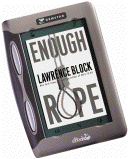
Figure 1: The GEB1150 - successor to
the Rocket ebook from Gemstar
The GEB devices are no longer available as Gemstar has withdrawn from the ebooks market completely, stating that they were unable to “obtain the size and revenue necessary to support the current ebook operations in today’s difficult business climate” [18]. The company has, however, agreed to ‘honor the warranty’ offered on the devices sold through SkyMall - its online ebook store.
In the period 2000-2001 Market Harborough Public Library piloted the Rocket ebook as part of a longitudinal study undertaken by Loughborough University [19]. Blackburn with Darwen Borough Libraries [20] were also pioneers in the use of these early ebook reading devices, but they also experimented with MP3 players loaded with audio files. Blackburn have recently acquired national funding to develop their ebook/e-audio service and have purchased 40 Compaq iPAQ PDAs to trial with users. They are also negotiating with the US ebook supplier, Overdrive, to supply a full online Web-based service and e-audio. The Co-East /Loughborough University ebooks project is also negotiating with Overdrive.
The Franklin eBookman is a cheaper, smaller alternative to the GEB dedicated ebook devices, and at one time it was available from a well known catalogue store, but has since been withdrawn. A couple of public libraries considered purchasing the Franklin ebookman, but decided to opt for PDAs instead. PDAs are versatile devices which offer better value for money.
Current hardware choices: PCs and PDAs
Academic libraries
The PC is the hardware platform of choice for the delivery of ebooks in UK higher education. Universities and colleges offer students suites of PCs located on campus, and new student accommodation now comes equipped with network points, where students can plug in their own computers and laptops. Remote access is desirable as many students live in private off-campus accommodation and an increasing number own their own PCs or laptops. Many students of computing, technology, business and management, for example, own their own computers, and these are dynamic disciplines which require up-to-date resources. Publishers have responded to this potentially strong market by producing many titles for these subjects in ebook form.
netLibrary is currently the leading supplier of ebooks to the UK academic community. They provide a PC-based service modelled on the traditional library, which integrates well with existing systems and resources. In September 2002, when the netLibrary User Group was set up, 17 out of 24 members were from the academic sector. However, some academic libraries offer additional ebooks services, for example the University of Huddersfield subscribes to Books24x7 (2200 titles in computing, IT and IT in business), and ENGnetBASE (140 engineering titles in PDF format) [21]. Both services are only accessible from campus-based computers.
A report on the use of PDAs in UK Higher and Further Education has recently been published which provides some indication of future technological trends among student populations [22]. The author, Ted Smith, argues that although PDAs have the potential to enhance teaching and learning, it is difficult to predict future usage patterns. Smith believes UK students are unlikely to buy PDAs for study purposes; if they are a course requirement then the institution will have to purchase them. However, ownership of mobile phones by students is high and the next generation phone will feature electronic calendars and task lists that can be synchronised with central servers or desktop/laptop computers. Textbooks are available as ‘sliced and diced’ e-content , and reading lists and bibliographic information might be easy to access through mobile technology. The mobile phone could, therefore, prove to be a viable adjunct to teaching and learning, but whether they will be ebook-capable remains to be seen.
Ebooks in academic libraries is a large subject deserving a fuller discussion than has been provided here. Readers may like to read the Issue Paper by Woodward and Edwards published in 2001, which provides a useful overview of the publishing industry and the role of ebooks in higher education. [23]
Public libraries
The People’s Network Programme [24] has provided computers with free Internet access and email in every public library in the UK. Public libraries are now looking to maximise the use of these new machines through the development of innovative electronic services. New services are being developed which build on existing services and meet local and national government agendas, (social inclusion, lifelong learning, e-government etc.). These services also have to be user-centred and libraries have to determine who might benefit from ebooks and e-audio. New services are supposed to build on, or complement, existing programmes in areas such as reader development and IT taster sessions. Public libraries are therefore taking an active interest in PC-based ebook models, including netLibrary and services offered by other ebook aggregators. This interest will only translate into action when practice-based evidence is made available, and it has been demonstrated that ebooks are viable in public libraries. Projects have now been funded to pilot several different ebook models and these will provide practical evidence and recommendations for future services.
In addition to making good use of library-based computers, remote access is also desirable. Users expect to be able to access electronic resources from home or their place of work. The London Borough of Richmond upon Thames has had an ebook service since March 2003 and users can access the netLibrary collection remotely through the library catalogue link. Authentication is achieved by clicking on the borrower information link, and entering a library card number and PIN (personal identification number). For those wishing to access the collection from any PC using netLibrary’s Web site, Richmond recommends the creation of a netLibrary personal account. Once this has been done users can make use of netLibrary’s advanced features, such as checking out an ebook (rather than just browsing), and adding favourites and notes to borrowed items.
- Personal Digital Assistants (PDAs) in public libraries
PDAs are becoming more affordable and have the benefit of being multifunctional devices. PDAs provide email and Internet access, plus standard applications such as spreadsheets and word processing. They are also lightweight and fit easily into the hand, and users can listen to audio books or music as well as read ebooks. An ebook reader (piece of software) usually comes pre-loaded, but if not it is freely available from the Internet. However it must be compatible with the device e.g. Palm Reader is required for devices with the PalmOS operating system, and Microsoft Reader for the Pocket PC. Initially the issue of formats and readers for ebooks was very confusing, but three main formats seem to have emerged (although this may change), all of which are available to download for free. They are:
- Adobe Reader (for ebooks in PDF format)
- Microsoft Reader
- Palm Reader (for use with certain PDAs but not PCs or laptops)[25]
Two projects have been funded to pilot the use of PDAs in public libraries:
- Blackburn with Darwen Borough Libraries
- Co-East and Loughborough University with Essex Libraries.
Both authorities are evaluating how PDAs might meet the needs of various groups of users e.g. housebound and disabled people and young adults.
1. Blackburn with Darwen Libraries
Blackburn have purchased 40 Compaq iPAQ PDAs with funding from the People’s Network Excellence Fund. Microsoft Reader and Audible.com digital audio player is installed on each device, enabling the borrower to listen to audio books and read ebooks. Blackburn have taken out a joint subscription with the London Borough of Richmond to purchase audio content through Audible.com [26]. This enables both authorities to purchase a wider range of audio ebooks for use on both PCs and PDAs. Blackburn are particularly keen to trial PDAs with young people, especially non-readers in the hope that the ‘cool’ technology will attract them.
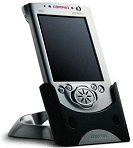
Figure 2: Compaq iPAQ PDA
Blackburn’s pilot scheme ended in September 2003, and they are now in process of analysing the feedback from the questionnaires that were handed out with the devices.
2. Co-East and Loughborough University with Essex Libraries
This Laser-funded project is piloting new models for ebooks in public libraries, and is jointly managed by Co-East, a library consortium in the East of England and Loughborough University. The project is testing twelve Pocket PC PDA devices (HP iPAQ 1910) loaded with titles supplied by OverDrive, a US company offering popular fiction, travel, business, study guides, and IT materials. They are also piloting ebrary - a US ebooks supplier to the library sector [27].
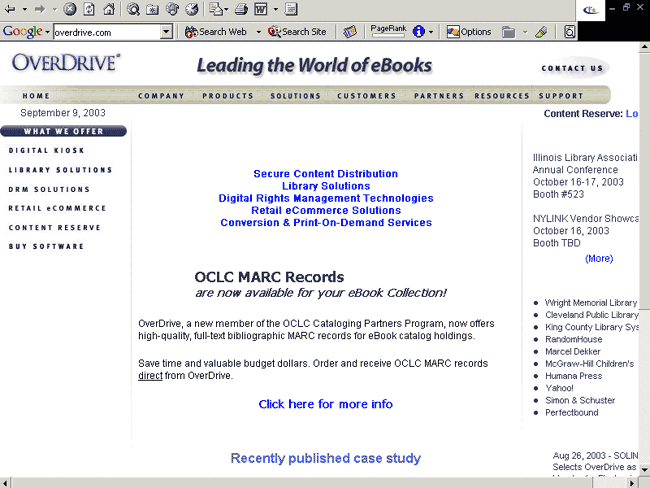
Figure 3: overdrive.com screenshot
- PDA model and e-content from Overdrive.com
OverDrive offers a flexible model which allows users to download titles onto their own PC or PDA. The project team will loan the dozen iPAQs they have purchased to special interest groups in Essex libraries, including housebound people, students, commuters and teenagers in care. Essex has a large potential audience for ebooks (around 400,000 individuals) and if this small scale pilot is successful, ebook suppliers should be queuing up to supply their future needs.
Until Overdrive was discovered, finding a supplier of fiction titles to UK public libraries had proved difficult. OverDrive currently supplies Cleveland Public Library (Ohio) with a range of popular titles which, they claim, are ‘flying off the library shelves’ [28].
- PC-based ebrary model
ebrary offers a different model to netLibrary. It is a multi-user, simultaneous access model for PCs, which means that more than one user can access a title at any given time. This model makes good sense, and members of the netLibrary User Group have, on several occasions, expressed a desire to see it implemented through netLibrary.
netLibrary have advised the User Group that publishers are the ultimate determinants of whether their titles are licensed for multi-users. netLibrary negotiates with publishers on an individual basis, and has indicated that many publishers will not consider the multi-user model, because it poses a threat to sales of printed books.
ebrary is able to offer the multi-user model however; though as it was designed for the US market and its methods of calculating numbers of library users, it does not transfer easily to the UK public library sector.
The implications of this type of issue and others that arise during the course of the project will be published in a report at the end of the project in 2004.
e- audio services in public libraries
A recent development has been the provision of e-audio services as a component of ebook services in public libraries. Both the London Borough of Richmond Upon Thames, and Blackburn with Darwen Borough Libraries offer e-audio services. They are now working in partnership to purchase e-audio content from Audible.com.
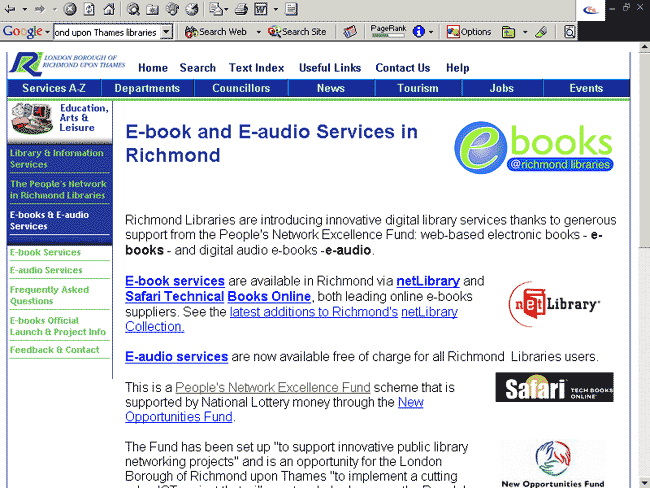
Figure 4: ebooks and e-audio services at
London Borough of Richmond upon Thames Libraries
E-audio files are similar to talking books, but they can be delivered on small, relatively inexpensive portable devices, for example MP3 players, which have traditionally been associated with music files. The quality of reproduction of spoken word files, coupled with superior storage capacity, makes MP3 players a viable alternative to books on audio-cassette.
E-audio is particularly suitable for people with disabilities, including visually impaired people and people with mobility problems. Housebound readers, young people with poor reading skills, reluctant readers and those with dyslexia or other learning difficulties can also be targeted for e-audio services.
The London Borough of Richmond upon Thames has purchased MP3 players for users to borrow. They are small, easy to operate, and have 64 megabytes of storage capacity, offering 20 hours of spoken word audio. Library members can borrow two titles for a two week loan period.
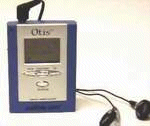
Figure 5: Otis 4 MP3 player
Richmond offers a comprehensive list of titles, which can be browsed by author or subject. From Ruth Rendell to Terry Pratchett and Ellis Peters there is something to suit every taste, plus non-fiction materials. Audio services can raise the profile and image of a public library if marketed properly. They demonstrate that libraries are able to offer electronic services using popular technology, whilst meeting the needs of a range of users, including those with special needs.
The netLibrary user group
In February 2002 netLibrary became a division of OCLC Online Computer Library Center, Inc.. OCLC is a large provider of computer-based cataloguing, reference, resource sharing etc. to libraries worldwide, therefore the acquisition of netLibrary ended a period of uncertainty about the company’s future when it ran into funding difficulties.
OCLC PICA [29] is a European library co-operative with headquarters in Leiden, the Netherlands. It also has a regional office in Birmingham, UK, which now has responsibility for netLibrary customers in Europe. In 2002 the Birmingham office set up the ‘NetLibrary User Group’ as a forum for future discussions between itself and its customers.
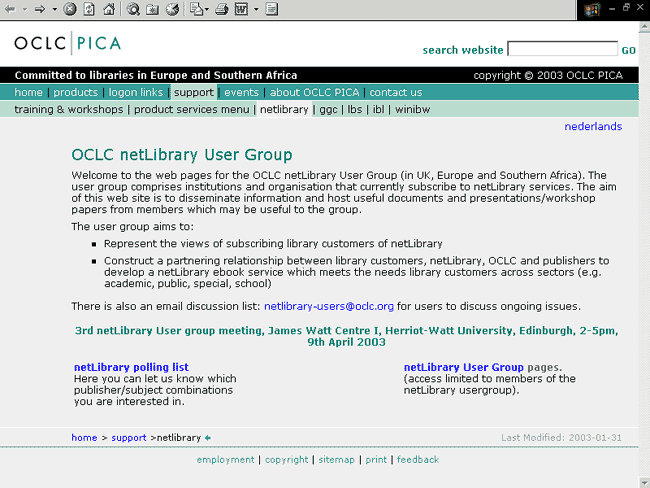
Figure 6: OCLC netLibrary User Group web pages
netLibrary is an ebook aggregator providing a turnkey system for libraries based on the traditional circulation model. The company negotiates directly with publishers to supply non-fiction content in digital format which is hosted on netLibrary’s servers. In July/August 2003 netLibrary was offering approximately 50,000 titles and adding around 1000 new titles each month [30].
netLibrary claims to be the “world’s premier provider of electronic books (eBooks) to over 7,000 academic, medical, special, corporate and public libraries.” The service to libraries includes reporting mechanisms for usage statistics and to assist with collection development; digital rights management for copyright clearance; and records in MARC21 format, so that netLibrary titles can be integrated into library catalogues.
netLibrary provides a PC-based, one user-one title access model for ebooks. In effect, this means that if a library purchases a single copy of a text, then only one reader at a time can access it. netLibrary’s customer base is diversifying, for example, in August 2003 it announced it was to be involved in a new national framework agreement to supply ebooks to National Health Service staff. [31] It is also negotiating with Nielsen Bookdata for the inclusion of netLibrary titles in Book Data’s BookFind and Whitakers databases. If this is successful, it will be possible to order netLibrary titles alongside print materials.
The netLibrary user group has convened four times since its inception in September 2002. It has around 24 members - the majority of whom are from academic libraries. Public libraries are well represented both within the group and on the committee [32]. A representative from Resource: the Council for Museums, Archives and Libraries, also attends group meetings.
Since the formation of the group, netLibrary customers have been able to voice their concerns and raise issues directly with netLibrary staff. ‘Wish lists’ of required titles have been created which netLibrary use to negotiate with publishers. Lists include specific titles and also subjects where coverage is poor. The group has also put forward suggestions for future enhancements to the service, for example the need for a simultaneous access model. Athens authentication (the access management system used in UK academic libraries) has also recently been implemented at the request of academic members of the group.
Conclusions
This article has barely scratched the surface of this complex topic. Ebooks are well established in US libraries and it is just a matter of time before Europe catches up. One of the key factors affecting the take-up of ebooks in the UK has been that content and services have been developed by US companies for the US market and this represents a sizeable market to ebook publishers and aggregators.
Content suitable for UK (and European) markets was, until recently, in very short supply, although pricing and access models also put ebooks out of reach for many UK public libraries. In some subject areas it may not matter if materials have a US bias, but it is important in subjects such as law and medicine, especially in the academic sector, where booklists are made up of titles from leading international publishing houses.
netLibrary is now trying to remedy this situation and has recently added content from a range of international publishers including Kluwer, Blackwell, John Wiley and University presses (e.g. Oxford, Cambridge, Edinburgh).
The public library sector is waiting for reports from the projects mentioned above before taking further action. Hampshire County Council will be joining Richmond, Blackburn and Essex however, as it has recently been given the go-ahead to provide ebook services in Hampshire libraries. Hampshire is now part of a consortium called Co-South, and other libraries may follow its lead.
The audience for ebooks in public libraries is much harder to quantify and usage is not guaranteed. Marketing is therefore vital, as people will not use ebook collections if they do not know they exist or if they cannot see the purpose of them. Ebooks should be linked to, and integrated with, existing collections rather than simply bolted on if usage is to be maximised and costs justified. Ebooks can be linked to exhibitions and ‘theme’ weeks in museums, archives, and libraries. In this way ebooks are not seen as isolated examples of new technology, but resources that complement and enhance existing collections. For example a local authority may decide to celebrate the life of a writer or musician who has local associations, and here a link to a relevant ebook or e-audio title can be placed on library and museum Web pages and included in any promotional literature.
Reference books and other non-fiction materials (books on travel, gardening, computing, finance and ‘How to’ guides etc.) are standard fare in public libraries, but there may be only one copy of a text located in a central or reference library. This requires travelling to the library to read it. If this book is made available as an ebook, then members of the library can access it from any branch, or from the home or office. Libraries are gradually moving from holdings-based models towards access models, and the digital library can complement and promote the traditional library, with a bit of thought.
However, this does not mean those sheets of paper bound between covers can be abandoned. Users will want belt, braces, laces, buckles the lot. Collection development therefore becomes more complex, and librarians have to decide how far their shrinking budgets will stretch. They have to consider a range of options including sharing subscription costs through partnerships and consortia and offering ebooks-only services where appropriate, for example for short loan collections in academic libraries, or for standard reference texts where online access may provide a better solution than print.
Many information professionals remain sceptical about ebooks. But we should look beyond the ebook to the wider world of learning. Distance and e-learning are becoming accepted modes of study, and e-learning has been the focus of a recent consultation document from the Department of Education and Skills [33]. In this document the DfES states that e-learning has the potential to ‘revolutionise’ teaching and learning, and talks about ‘embedding and exploiting technologies’. Ebooks can support e-learning by offering 24⁄7 access but they need to be embedded into curricula and collections in order to do this effectively.
In addition, we need to forget the traditional book/reading model; ebooks are about fast and easy access to information, rather than reading an entire novel online. O’Leary describes ebooks as being for use, rather than for reading i.e. you use them rather than read them [34]. He also points that ebooks are of interest to professionals - doctors, engineers, lawyers and scientists etc. as well as students. Now, if all those expensive texts targeted at library and information professionals were made available as ebooks, that would be useful.
References
- Clifford Lynch. The Battle to define the future of the book in the digital world. First Monday, volume 6, number 6 (June 2001). http://firstmonday.org/issues/issue6_6/lynch/index.html
- see Ariadne issues 27,29,33. http://www.ariadne.ac.uk
- Midgley, S. The end of books? The Guardian, 9 April 2002. http://education.guardian.co.uk/
- Sun Microsystems Inc. (August 2002) Digital Library Technology Trends. p.3.
http://www.sun.com/products-n-solutions/edu/whitepapers/ pdf/digital_library_trends.pdf - Project Gutenberg: http://promo.net/pg/
- Free ebooks (Australian portal offering extensive lists of free ebooks from all parts of the world). http://www.e-book.com.au/freebooks.htm
- Loughborough University and Co-East. A feasibility study for developing usage models for Web-based and hardware-based electronic books
http://www.lboro.ac.uk/departments/dis/disresearch/ebooksinpublib/index.html - The Laser Foundation: http://www.bl.uk/concord/laser-about.html
- London Borough of Richmond upon Thames - ebooks service: http://www.richmond.gov.uk/depts/opps/eal/leisure/libraries/pn/default.htm
- Safari Technical Books online (from Proquest): http://proquest.safaribooksonline.com
- netLibrary: http://www.netlibrary.com
- Audible.com: http://audible.com/adbl/store/welcome.jsp. The company produces a monthly newsletter which is published on the Web site or available by email.
- netLibrary user group Web site (members section is password protected):
http://oclcpica.org/?id=1206&ln=uk - Updates issued by OCLC PICA to netLibrary User Group at meetings on 9th April 2003 and 16th July 2003, OCLC/PICA, Birmingham.
- Overdrive.com: http://www.overdrive.com
- James Dearnley, Cliff McKnight, Mari Connal and Gemma Towle. The People’s Network, Public Libraries and ebooks: specification for baseline intelligence-gathering work. Department of Information Science, Loughborough University April 9 2002. http://www.resource.gov.uk/documents/re177rep.pdf
- Rocket ebook (superseded by two models: the GEB 1150 and GEB 2150):
http://www.gemstar-ebook.com - see “Another important eBook announcement” on Gemstar Web site (news item dated 16 July 2003): http://www.gemstar-ebook.com/cgi-bin/WebObjects/eBookstore.woa/wa/
- Two studies were undertaken in 2000 and 2001 at Market Harborough public library by James Dearnley and Cliff McKnight of Loughborough University’s Department of Information Science. See: Dearnley, J. & C. McKnight. The revolution starts next week: the findings of two studies considering electronic books. Information Services & Use, 21(2), 2001, pp. 65-78.
- Blackburn with Darwen Borough Council library and information services: http://library.blackburnworld.com/
- For further information on electronic books at the University of Huddersfield, see the Computing and Library Services (CLS) pages at: http://wwwcls.hud.ac.uk see also: Ian Jennings and Eileen Hiller (University of Huddersfield). Netlibrary ebooks. SCONUL Newsletter 23 Summer/Autumn 2001.
- Ted Smith (2003) Personal Digital Assistants (PDAs) in Education. http://www.techlearn.ac.uk/NewDocs/PDABriefing.pdf
- Hazel Woodward and Louise Edwards. (September 2001). Shaping a strategy for ebooks: an issue paper. http://www.jisc.ac.uk/index.cfm?name=wg_ebooks_strategy1 see also the JISC ebooks Working Group: http://www.jisc.ac.uk/index.cfm?name=wg_ebooks_home
- The People’s Network Programme: http://www.peoplesnetwork.gov.uk
- ebooks123 provides useful help pages on the 3 main ebook readers (software enabling you to read an ebook on a PC or PDA) i.e. Adobe Reader, Microsoft Reader and Palm Reader: http://www.ebooks123.com/
- e-audio services from Audible.com: http://www.audible.com
- ebrary. http://www.ebrary.com
- ebooks are flying off the library shelves. News item dated 5 May 2003 on OverDrive.com Web site: http://www.overdrive.com/news/pr/05052003.asp
- OCLC PICA: http://www.oclcpica.org
- figures supplied by netLibrary to members of the netLibrary User Group in 2003.
- press release from OCLC PICA, Birmingham, UK dated 1 August 2003.
http://www.oclcpica.org/?id=1310&ln=uk - Members of the netLibrary user group committee (for 2002⁄2003): Ian Jennings, University of Huddersfield (Chair); Lynn Allardyce Irvine, Glasgow Caledonian University (Secretary); Penny Garrod, UKOLN; Jane Weller, Hampshire County Library HQ and Niels Jorgen Blabjerg, Aalborg University Library, Denmark.
- Department for Education and Skills. (July 2003). Towards a Unified e- Learning Strategy. Consultation document. http://www.dfes.gov.uk/elearningstrategy/
- Mick O’Leary. Ebook scenarios updated. Online. 27 (5) Sept/Oct 2003. http://www.infotoday.com/online/sep03/oleary.shtml
Author Details
Penny Garrod
Public Library Networking Focus
UKOLN
Email: p garrod@ukoln.ac.uk
Web site: http://www.ukoln.ac.uk/public/
Article Title: “Ebooks in UK libraries: where are we now?”
Author: Penny Garrod
Publication Date: 30-October-2003
Publication: Ariadne Issue 37
Originating URL: http://www.ariadne.ac.uk/issue37/garrod/
